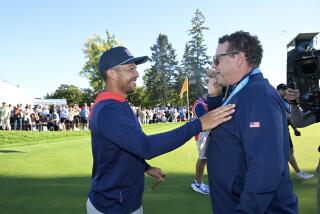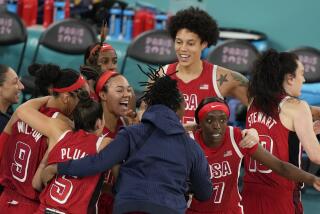It’s Almost a Nightmare for U.S. Men
- Share via
SYDNEY, Australia — The mouth goes dry, the mind goes blank.
This is not happening, can’t happen . . . is going to happen, is destined to happen.
The team that should never again be called a Dream Team did not lose Friday.
Everything pointed to one of the most monumental upsets in basketball history except the ball itself, which left the hands of Lithuania’s Sarunas Jasikevicius from beyond the three-point line on a desperate shot at the buzzer only to fall harmlessly short of the rim for an 85-83 U.S. victory--sinking the hopes of Lithuania and every pair of eyes that yearned to see a piece of history.
None of them belonged to the U.S. players, who would have become the first to lose an Olympic game since NBA players started competing in the Olympics in 1992.
“I think 12 guys would have changed their identities,” said guard Jason Kidd, who was guarding Jasikevicius on the play.
“We would have been moving as far away as you can go. New Zealand would have been my pick.
“You guys would probably help us find citizenship in a different country. You’d be handing out visas.”
It was a game in which the stars were aligned, the referees were predictably unpredictable and the U.S. players made enough mistakes to give Lithuania every chance.
“If somebody had told us coming to the Olympics that we would lose to the U.S. by two points, nobody would have believed him,” Lithuania’s Tomas Masiulis said. “But tonight, we even had a chance to win.”
Only days earlier, Jasikevicius--pronounce it “Yes, the cabbages,” is what people advised when he played at Maryland--uttered sacrilege when he suggested the day was coming when the U.S. would lose.
Soon and in these Olympics, Jasikevicius said, if the U.S. didn’t play better than it did in a nine-point preliminary victory over Lithuania that until Friday was the closest game for the U.S. in the Olympics.
The Americans did not play so bad Friday, shooting 48% and playing with a purpose they haven’t shown, even leading by 12 at halftime.
And yet--had Jasikevicius’ marvelous 27-point performance ended with one more three-pointer, this would have gone down as the Lithuanian equivalent of the Miracle on Ice, with an echo of the U.S. basketball team’s loss to the former Soviet Union in the controversial finish at the 1972 Olympics.
“We talked about it when we played the Russians. People asked us, ‘Did we understand what happened in ‘72?’ ” Kidd said.
“I have to say, this could have been another Russia game. If somebody would have come out of the stands and told them to put four more seconds on the clock and try it again, you’d say it was Munich all over.”
It seems almost an afterthought now, but the U.S. will play France on Sunday for the gold medal, with Lithuania facing Australia for the bronze.
“The gold medal will be well-deserved. Can’t nobody say the gold medal wasn’t well-deserved,” center Alonzo Mourning said, guaranteeing the U.S. will win and bemoaning the officiating without saying so explicitly.
“I’m just so happy we were able to win the ballgame under the hardest of circumstances.
“When they made their run, and I saw how the game was changing, I said we were in a dogfight now.”
There were some bad calls--par for the course in international basketball, though few of the NBA players are used to it and assistant coach Larry Brown was so upset he had to be restrained at the end of the game.
As close as it was, Lithuania might have blown its own best chance.
Had Ramunas Siskauskas not missed two of three free throws when he was fouled by Antonio McDyess on a three-point attempt with 43 seconds left, Lithuania would have led by three instead of one.
That might have changed the game, but on the other end, a fearless Vince Carter drove the lane and sank a difficult shot with 31 seconds left for an 82-81 lead.
“I just knew I had to get to the basket,” said Carter, who led the U.S. with 18 points but missed four of six free throws, though he scored three of the Americans’ final four baskets.
“Man, I don’t know, a tight situation like that,” Carter said. “It’s been a long time since I got nervous or tight. I don’t believe in that. I always relax.
“You spend any time worrying about, ‘What if we’re the first team to lose?’ . . . You think about that, and you’ll lose the Olympic gold medal.”
It was far from over.
With the U.S. pressing after Carter’s basket, 6-foot-11 Kevin Garnett got a hand on the ball, only to miss two free throws when he went to the line after being fouled with 25 seconds left.
But McDyess, who had blundered by fouling on the three-pointer moments earlier and was playing with three new stitches in his lip from a head butt earlier in the game, grabbed the rebound and put the ball in the basket for an 84-81 lead.
“I was feeling so low, my heart was in my shoe,” McDyess said.
“I knew if he missed the second I had to get the ball, and I said, ‘Ain’t nobody gonna stop me from getting this ball.’ ”
Then Jasikevicius drove for a layup, shredding the U.S. defense the way the Lithuanian players did much of the game with their drives and sharp passing.
With nine seconds left and the U.S. up by one, Siskauskas fouled Kidd--but Kidd made only one of two, and although McDyess got hold of a loose ball, he was called for a violation on the jump ball.
Lithuania’s ball, down by two with 4.6 seconds left.
It belonged to Jasikevicius, who took it on the perimeter, with Kidd and McDyess defending.
“When he turned his back to me the first time, I knew he didn’t know how much time was on the clock,” Kidd said. “I knew he’d take a quick shot.
“The only thing I was going to do was get out of the way. I didn’t want the official to have a chance to make a call.”
Whether Jasikevicius got the shot off in time was open to debate, but an official signaled that it would count if it went in.
Hearts stopped, but the U.S. team’s unbeaten steak with NBA players did not.
“We didn’t lose,” Carter said. “I don’t care what the world thinks. Look at the scoreboard.”
Disaster averted.
Kidd smiled.
“But wasn’t it a fun game?”
(BEGIN TEXT OF INFOBOX / INFOGRAPHIC)
Closing the Gap
A look at the U.S. men’s basketball team’s last three Olympic appearances:
*
1992 GAMES, BARCELONA
Score Margin
U.S. 116, Angola 48 68
U.S. 103, Croatia 70 33
U.S. 111, Germany 68 43
U.S. 127, Brazil 83 44
U.S. 122, Spain 81 41
U.S. 115, Puerto Rico 77 38
U.S. 127, Lithuania 76 51
U.S. 117, Croatia 85 32
Average margin: 43.8
*
1996 GAMES, ATLANTA
Score Margin
U.S. 96, Argentina 68 28
U.S. 87, Angola 54 33
U.S. 104, Lithuania 82 22
U.S. 133, China 70 63
U.S. 102, Croatia 71 31
U.S. 98, Brazil 75 23
U.S. 101, Australia 73 28
U.S. 95, Yugoslavia 69 26
*
Average margin: 31.8
2000 GAMES, SYDNEY
Score Margin
U.S. 119, China 72 47
U.S. 93, Italy 61 32
U.S. 85, Lithuania 76 9
U.S. 102, New Zealand 56 46
U.S. 106, France 94 12
U.S. 85, Russia 70 15
U.S. 85, Lithuania 83 2
Average margin: 23.3
More to Read
Go beyond the scoreboard
Get the latest on L.A.'s teams in the daily Sports Report newsletter.
You may occasionally receive promotional content from the Los Angeles Times.






